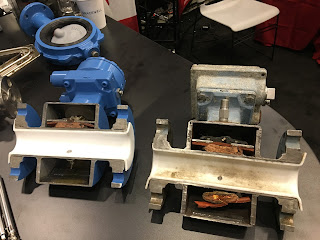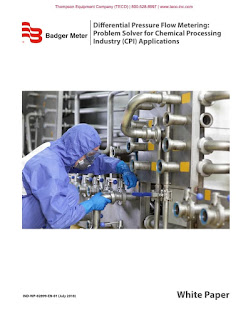Thermo Scientific Ramsey manufactures industrial in-motion weighing, monitoring and inspection equipment used for process control and production control in a wide variety of industrial applications. Products include weighbelt feeders, belt scales, metal detectors, sampling systems, level indicators, conveyor safety switches. Below is an embedded copy of the Thermo Scientific / Ramsey Bulk Weighing and Monitoring Catalog. You can download a copy at the TECO website here.
Providing educational information on flowmeters, industrial control, process instrumentation, valves, and valve automation. Posts include interesting and unique industrial control applications, new product information, and ways of improving efficiency and saving money through proper maintenance, repair, service, and re-manufacturing.
Courtesy of Thompson Equipment Company | TECO-INC.COM | (504) 833-6381
Electromagnetic Flow Metering
 |
| Cutaways of electromagnetic flow meters - one removed from service (right) and one remanufactured (left). |
Electromagnetic flow metering is based on the principles of Michael Faraday's 1832 discovery. When a conductive liquid, such as water, is moved through a magnetic field a voltage is induced in the liquid at right angles to the magnetic field. The size of the voltage is directly proportional to the volume flow rate. This induced voltage is detected by sensors known as electrodes. These electrodes transfer the voltage signal to the processing electronics where it can be converted into a usable industrial standard signal.
It's important that the flow meter tube is non-magnetic, and austenitic stainless steel is the most commonly used material. It's also essential that the flow meter tube has a lining that electrically insulates it from the liquid inside, and provides a non-reactive barrier with any corrosive liquids being measured. Distinguishing between flow induced voltage changes, electrochemical noise, and plant induced noise, is a barrier to accurate electromagnetic flow metering. This can be particularly difficult in dirty and industrial applications. The choice of electromagnetic flowmeters with advanced noise suppression can mitigate unwanted noise and provide extremely high orders of accuracy as a result.
To ensure that your electromagnetic flow meters will be optimized for safety, longevity, and performance, the advice of a qualified flow instrumentation expert should be sought out. That expert will be able to help you with the best selection of the appropriate flow device for your specific application, be it electromagnetic flow meters or another flow technology.
Differential Pressure Flow Metering for the Chemical Processing Industry White Paper
 Flow measurement is a critical aspect of plant operation in the Chemical Processing Industry (CPI). Users choosing equipment to meter the flow of liquid or gas processes must consider a wide range of factors to arrive at an optimal solution Experience has shown there are significant differences between meter technologies, with each type of device having its own advantages and disadvantages for processing facilities
Flow measurement is a critical aspect of plant operation in the Chemical Processing Industry (CPI). Users choosing equipment to meter the flow of liquid or gas processes must consider a wide range of factors to arrive at an optimal solution Experience has shown there are significant differences between meter technologies, with each type of device having its own advantages and disadvantages for processing facilitiesCommon Differential Flow Metering Methods:
- Venturi
- Cone Meter
- Wedge Meter
- Averaging Pitot Tube
Badger Meter, a premier manufacturer of industrial flow meters, has authored an excellent white paper explaining the use of differential pressure flow metering in the chemical processing industry. You can get the white paper at this link.
For more information, visit Thompson Equipment Company (TECO) at https://teco-inc.com or call 800-528-8997 for immediate service.
Subscribe to:
Posts (Atom)